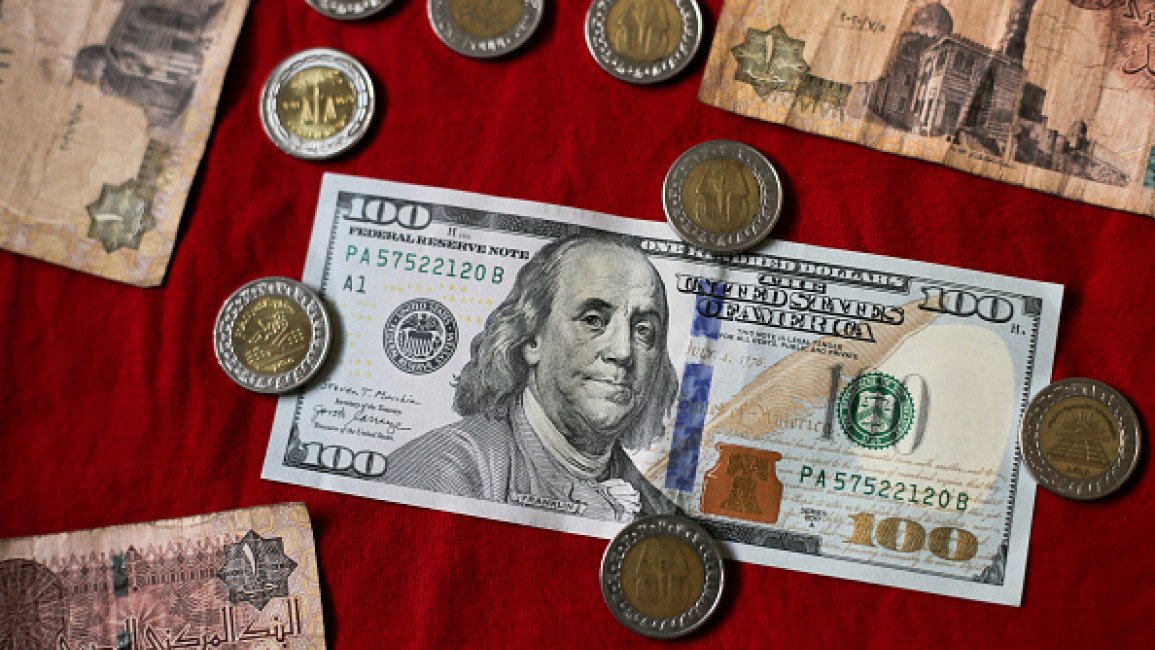Amid war on Gaza, Egypt sees highest exchange rate for US dollar in black market
The value of the US dollar against the local currency in the Egyptian informal market skyrocketed over the past two weeks, a major blow to the country's already ailing economy, and the increase is believed to be a direct consequence of the ongoing deadly Israeli war on the neighbouring besieged Gaza Strip.
One US dollar is officially equal to about 30.90 Egyptian Pounds (EGP), whereas its value against the local currency black market ranges from 45 – 47 EGP at the time of publication, leading the prices of basic commodities, mostly imported, to rise tremendously.
"Israel-Gaza war is one of the factors taking a heavy toll on the Egyptian pound, bringing it down to a record low. But this is not the sole reason behind the declining value of the local currency," economic researcher Ahmed Abdel-Thaher told The New Arab.
"Perhaps Egypt is on top of the countries in the region influenced by the ongoing fighting between the Palestinian Hamas faction ruling the Gaza Strip -Hamas as the war has increased the geopolitical risk for the country," he explained.
All indicators have so far suggested an ongoing shortage of foreign currencies, especially the US dollar, even after the government has taken several measures in recent months to lower the national economy's dependency on the greenback.
Egypt will officially join the BRICS group of emerging later in 2024. Earlier this year, the Russian central bank added the Egyptian pound to the Russian exchange rate. Yet, such measures have not paid off.
Egypt had earlier opened the door to dollar-free trade transactions through bilateral agreements with Russia, China and India, a step that may help promote the inclusion of the Egyptian pound in international financial transactions with BRICS countries, which are also seeking to end dollar dominance.
"Egypt, a BRICS member in the near future, has been viewed as an important step in reducing the USD dominance, which reflected in the value of the dollar in the black market for a few weeks. But it is no longer the case," Abdel-Thaher argued.
Greenbacks no more?
The Egyptian local currency has long been struggling against the US dollar due to controversial economic measures taken by the government of President Abdel Fattah al-Sisi at a time when importers have resorted to the parallel market to secure their need for USD.
In October last year, the Central Bank of Egypt implemented an exchange rate flexibility, allowing the pound's value to be regulated by market forces.
Moreover, the government has taken some provocative measures that caused an uproar among Egyptians living abroad or others travelling for leisure, limiting the use of credit cards to only US$250 per month and banning the use of debit cards for cash withdrawal abroad.
Citizens can no longer acquire dollars from Egyptian banks or currency exchange offices, whereas clients of national banks were obligated to receive their US-dollar withdrawals in the local currency instead, which led many to refrain from having accounts in US dollars.
A shadow market trader, who declined to be named due to his illegal activities, told TNA that "the recent decision to control the use of debit and credit cards abroad caused the supply to be higher than the demand, which made the rate of the US dollar increase even on an hourly manner rather than daily."
"Many Egyptians have attempted to be witty by withdrawing cash in US dollar from ATMs abroad at the local rate or buying goods and selling them in Egypt via credit and debit cards," Abdel-Thaher explained.
But at the same time, the government’s recent decision has taken a toll on Egyptians studying abroad and their families as well as businesses, leading them to seek US dollars through unofficial channels and use cash abroad in countries where people do not use cash much.
Economic turmoil
A high-level official source, meanwhile, told TNA on condition of anonymity for not being authorised to talk to the media that "even state entities currently seek US dollars and other foreign currencies through the black market to handle their deals."
The official added that “"the government's recent pursuits to reduce the domination of the US dollar can't be considered successful as the dollar's exchange rate in the shadow market has not ceased to rise."
Egypt is the world's largest importer of wheat, and its current economic problems have been blamed on external factors such as the Russian war on Ukraine, which severely affected global supplies of foodstuff and other essential commodities.
Over the past months, the Egyptian government has begun selling state assets to wealthy Gulf nations, including army-owned firms, to attract foreign currency and liberate the economy from state control, a significant demand of the US$3 million loan programme signed with the International Monetary Fund (IMF).
The situation has been exacerbated by ongoing corruption and an eight-year borrowing spree, which has seen the state spend money on "white elephant" projects such as the New Administrative Capital.
Egypt has been facing record inflation, making it difficult for the country to repay its external debts. The Egyptian external debt soared by 5.1 per cent during the fourth quarter of 2022, reaching US$162.94 billion, a total of US$10 billion more than the previous quarter, according to official figures.



